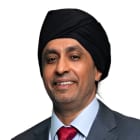Commentary
Amid domestic pressure to take military action against Pakistan, there are lessons from India’s response to two previous attacks during Indian Prime Minister Narendra Modi’s term, says RSIS’ Sinderpal Singh.

New: You can now listen to articles. 
This audio is generated by an AI tool.

30 Apr 2025 12:28PM
SINGAPORE: After unidentified shooters opened fire on tourists and killed 26 civilians in Pahalgam in Kashmir on Apr 22, the question is not whether the Indian government will respond militarily against Pakistan, which it blames for the attack, but when and at what scale.
India views this as the third major terror attack in the disputed Himalayan territory since Narendra Modi’s government assumed power in 2014. On Tuesday (Apr 29), the Indian prime minister gave the military “complete operational freedom” to decide on a response.
Tensions between India and Pakistan are once again rising, breaking through the “normalcy” in Kashmir that New Delhi had sought to project.
Already, India has taken some immediate steps to respond to the Pahalgam attacks. It closed the only border crossing with Pakistan, terminated visas and expelled some Pakistani diplomats.
In an unprecedented step, India also suspended the Indus Water Treaty, the historic treaty signed in 1960 between India and Pakistan to govern the sharing of river waters. As the upstream neighbour, India has vowed to cut off Pakistan’s water supply.
As for India’s military response, lessons from two attacks in Kashmir during Mr Modi’s term offer some clues about the probability and possible timing and scale.
LEARNING FROM PAST HOSTILITIES
Precedence could set the threshold for retaliation. India blamed Pakistan for attacks in 2016 and 2019, as it has done for the recent Pahalgam attacks, and launched cross-border strikes in response.
In 2016, there was the Uri incident where 19 Indian soldiers were killed by armed militants in an army base. There was significant pressure from large sections of the Indian population for the Bharatiya Janata Party-led government to punish Pakistan with retaliatory action.
Ten days later, the Indian government announced it had launched surgical strikes against terrorist training camps across the border in Pakistani-administered areas of Kashmir. India claimed it had inflicted significant casualties while Pakistan denied any strike, instead detailing a skirmish between troops that resulted in some casualties.
This seemed to be sufficient to satisfy the public while ensuring there was no escalation in hostilities.
In 2019, there was the Pulwama incident where 40 Indian paramilitary personnel perished when a suicide bomber attacked their vehicle convoy.
Just 12 days later, Indian warplanes conducted bombing raids across the border in Pakistani-administered Kashmir against alleged terrorist training camps. This was the first time since 1971 that either country had crossed the border to conduct bombing raids and Pakistan retaliated the next day by using its warplanes to bomb targets in Indian-administered Kashmir.
Unlike in 2016, the possibility of hostilities spiralling into an all-out war between the two nuclear-armed states grew. But the capture and then subsequent release of a captured Indian Air Force pilot allowed both countries an off-ramp to end retaliatory military action.
A MILITARY RESPONSE MIGHT BE INEVITABLE
These precedent clashes allow for three observations on what might unfold after the latest attack in Pahalgam.
First, it is highly likely that the Indian government will retaliate militarily against Pakistan as there is similarly growing public pressure to punish it for its alleged involvement in the terror attack. Having done so previously when soldiers died, it would be politically untenable not to respond with military action in the face of civilian deaths.
The Uri and Pulwama incidents garnered an Indian military response within 10 to 12 days and many expect a quick response this time.
Second, this episode and India’s likely response will end a period of relative peace in Kashmir since 2019 and then in 2021 when both sides agreed to a ceasefire across the Line of Control (LOC) in Kashmir. The Pahalgam attack upended the notion of “normalcy” having returned to the Kashmir valley, with the BJP-led government wanting to use the Kashmir state elections completed in October 2024 as proof of the end of wide-scale violence and terrorism in the state.
Third, despite huge pressure to respond militarily, India would be concerned about how to calibrate it, given the possible retaliation from Pakistan, further escalation and international pressure. The 2019 episode demonstrated the dangers of such escalation.
While India would want to limit the hostilities, it is in Pakistan’s interest to let things escalate – to a limited extent – and wield the prospect of nuclear weapons use to encourage third-party intervention. Pakistan has historically attempted to internationalise the Kashmir conflict while India has consistently insisted it is strictly to be resolved by the two countries alone.
Pakistan has already warned that blocking or diverting allocated water would be an “act of war and responded with the full force across the complete spectrum of national power”.
The United States has traditionally asked both sides to exercise caution against spiralling hostilities. This time, the Trump administration has given its support to India in the aftermath of the attack, but it has not criticised Pakistan.
China has urged restraint on both sides but supported Pakistan’s demand for an impartial international probe into the Pahalgam attacks as Pakistan denies any involvement in the attacks. An Indian military strike risks growing international pressure against it, led by Pakistan and China, especially if hostilities do not end quickly.
STRONG BUT CALIBRATED
Given that the Indian general elections took place recently, and the next state elections will be in November, domestic pressures will be lower than in 2019. India probably will err on the side of caution and find a response that may lie between its 2016 and 2019 responses.
India will want a strong response, but it will need a calibrated one.
The government’s public statement on giving the armed forces operational freedom to “decide on the mode, targets and timing’ of the response is meant to publicly signal that Indian leaders are ready to back a military response which, if calibrated, can be justified on military operational terms.
This might be especially important as India navigates the challenges of dealing with a new Trump administration, which has thrown steep tariffs at Indian exports and is threatening to target its major pharmaceutical industry, as well as its perennially difficult relationship with China.
Dr Sinderpal Singh is Assistant Director and Coordinator of the South Asia Programme and Regional Security Architecture Programme, at the S Rajaratnam School of International Studies, Nanyang Technological University.

Comments are closed.